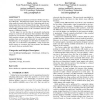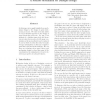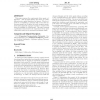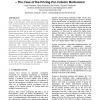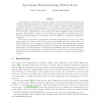FOCS
2005
IEEE
14 years 8 months ago
2005
IEEE
We study truthful mechanisms for auctions in which the auctioneer is trying to hire a team of agents to perform a complex task, and paying them for their work. As common in the ï¬...
SIGECOM
2006
ACM
14 years 8 months ago
2006
ACM
Online reputation mechanisms need honest feedback to function effectively. Self interested agents report the truth only when explicit rewards offset the cost of reporting and th...
ACMICEC
2006
ACM
14 years 8 months ago
2006
ACM
Auction mechanism design has traditionally been a largely analytic process, relying on assumptions such as fully rational bidders. In practice, however, bidders often exhibit unkn...
TARK
2007
Springer
14 years 8 months ago
2007
Springer
In this paper is we apply insights from mechanism design to the design of agent interaction protocols. We show how this allows us a more flexible approach to the design of agent ...
ATAL
2007
Springer
14 years 8 months ago
2007
Springer
This paper proposes the requirements driven agent collaboration. This proposal assumes that there are plenty different service agents distributed in Internet. When a request for ...
HICSS
2007
IEEE
14 years 8 months ago
2007
IEEE
One of the main contributions of classical mechanism design is the derivation of the Groves mechanisms. The class of Groves mechanisms are the only mechanisms that are strategy-pr...
FOCS
2008
IEEE
14 years 8 months ago
2008
IEEE
The central problem in computational mechanism design is the tension between incentive compatibility and computational ef ciency. We establish the rst significant approximability ...
SIGECOM
2009
ACM
14 years 8 months ago
2009
ACM
The literature on algorithmic mechanism design is mostly concerned with game-theoretic versions of optimization problems to which standard economic money-based mechanisms cannot b...
Presentation
Presented at First Electrical Science Divisional Symposium, Indian Institute of Science.
This is joint work with Prof David Parkes, Harvard University.
STOC
2009
ACM
15 years 2 months ago
2009
ACM
We put forward a new approach to mechanism design, and exemplify it via a new mechanism guaranteeing significant revenue in unrestricted combinatorial auctions. Our mechanism ? su...

